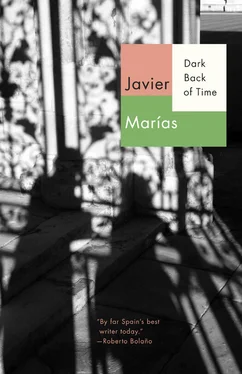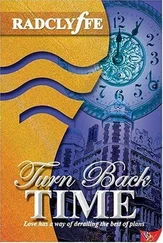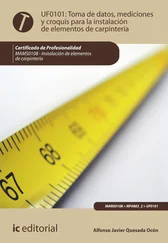And I still must reproduce the first paragraph of the following chapter, which, perhaps, I could have espoused more than any other and which gives a clear and complete idea of the nature of that slight, passing delirium loaned by the author who breathes and speaks, Javier Marías — or Xavier Márias, he was then — to the nameless narrator who saves his breath and only writes, but for that reason has the more persuasive voice. The paragraph says:
“I asked and still ask myself all these questions not out of pity for Gawsworth, who is, after all, only the false name of a man I never met, whose books — which are the only part of him I can still see, besides the photographs of him alive and dead — don’t say much to me, but out of a curiosity tinged with superstition, convinced as I came to be, on certain interminable afternoons of that spring or Trinity term, that in the end I would meet the same fate.”
Now that Gawsworth has been introduced to those not previously acquainted with him and recalled to those who met him already in All Souls , I shall return to young Wilfrid Ewart of whose light put out suddenly and without forewarning or testament in Mexico City I was preparing to speak earlier.
In his practice of frequently looking after ill-fated writers whom he tried with scant or ephemeral success to salvage from oblivion, John Gawsworth seems to have been assimilating his life to theirs, or foreseeing or perhaps defining himself. In the thirties he collected and edited several anthologies of tales of mystery and terror, I know of at least seven or eight, whose respective titles were Strange Assembly; Full Score; New Tales of Horror by Eminent Authors; Thrills (just Thrills ); Thrills, Crimes and Mysteries; Crimes, Creeps and Thrills; Masterpiece of Thrills; and perhaps Path and Pavement —the first published in 1932, the last in 1937, which is to say that all of them were published when the hyperactive and extremely precocious Gawsworth was between twenty and twenty-five years of age. They almost always include stories by the elderly and eminent masters Shiel and Machen — respectively King Felipe I and Archduke of Redonda — as well as by their disciple and crown prince, under his various names. There is one by his pal Lawrence Durrell and many by other future members of the kingdom’s “intellectual aristocracy.” But there are also many stories by writers who could never receive any dukedom or office or title from King Felipe or King Juan because they were truly, completely ill-fated, like the young suicides Richard Middleton and Hubert Crackanthorpe. Middleton was a man of great and recalcitrant talent who killed himself with chloroform in 1911 at the age of twenty-nine, at number 10, rue de Joncker, Brussels, without yet having published a single book (that began in 1912). Archduke Machen wrote of him: “He was impatient, he would not wait. He could not relax … I don’t remember hearing him laugh; not openly and largely, with a relish in the deed. His humour was usually tinged with bitterness.” And according to a contemporary who saw quite a bit of him, Middleton put an end to his days out of mere “hatred of life”, which he used to call “the woe.” Next to the chloroform bottle he left a card with this sentence written across it: “A broken and a contrite spirit Thou wilt not despise.” Crackanthorpe, who had a lesser and more realistic talent and a more peaceable temperament, nevertheless threw himself into the Seine in 1896 at the age of twenty-six, for reasons of circumstance rather than of principle, after his wife ran away with another man. It took months to find his corpse, which was apparently so disfigured that his brother was able to identify it only by the cufflinks. Both men were Francophiles: Middleton a strict follower of Baudelaire, Crackanthorpe of Maupassant. An English magazine went so far as to claim that Crackanthorpe’s Parisian death was “God’s punishment for the worship of French idols.”
Also appearing in these anthologies of the 1930s were a number of stories by Wilfrid Ewart, under that name or under the name Herbert Gore, which was no less his own, and I included one of them, “The Flats,” in the anthology of rare tales of fear titled Cuentos únicos or Singular Stories that I collected and published in 1989, the same year as All Souls , and for which I rescued a few texts Gawsworth had included in the Thrills series, texts that have been completely forgotten today. In my anthology I also included a macabre tale by Gawsworth himself (the first work of his ever translated into any language and, for now, I fear, the last); the only story of the kind written by Durrell, the only one written by Sir Winston Churchill, an excellent story by the bilious Middleton, and also a story of my own — the temptation was irresistible — under the pseudonym of James Denham, whom, in the corresponding biographical notice, I described as having been born in London in 1911 and having died in 1943, fallen in combat in North Africa at the age of thirty-two, yet another ill-fated writer, even if this one was apocryphal. (Incidentally, little could I have imagined then that in 1996, when at last the film made by Querejeta Sr. and Querejeta Jr. and not based on All Souls was made, one of the character actors would be the very man whose last name I took for my occasional nom de plume , the Englishman Maurice Denham, today a venerable octogenarian whose performance is undoubtedly the best thing in the film. Small wonder that I sometimes have the feeling I draw things and events and even people to myself, but I try not to concede much importance to these coincidences — the perpetual activity of chance — or take them for exceptional occurrences unique to the “elect”; in the hands of a certain North American colleague they would have been good for a great deal of unconcealed fascination with one’s own life and several books, or at least notebooks.)
Almost all the authors of the Cuentos únicos were and continue to be so obscure, to Spanish readers especially, that it seemed appropriate to preface each story with a brief biographical note, which is why I had to invent one in the case of poor James Ryan Denham … But about certain very vagabond or obscure authors, I could learn almost nothing; I remember, for example, that in one case, that of Nugent Barker, I was unable to find even the date of his almost certain death, given that he was born in 1888, though who knows if he isn’t still alive; everything is possible. Another mysterious case, which was also striking and invited farther inquiry, was that of Wilfrid Ewart, in whose note I could write no more than:
“Wilfrid Herbert Gore Ewart (1892–1922) died, as his dates show, at the age of thirty, and Arthur Conan Doyle, the creator of Sherlock Holmes, opined sadly on learning of his death, ‘He would have gone right to the top.’ For his part, T.E. Lawrence, better known as Lawrence of Arabia, said of him on one occasion, ‘He needs no introduction to the reading public.’ And the inevitable John Gawsworth, who seems to have been friend to the entire world, wrote, at the beginning of his introductory note to Ewart’s posthumous book When Armaggedon Came (1933): ‘Wilfrid Ewart died a fraction over ten years ago; upon Old Year’s Night, 1922, to be precise, in the sultry darkness of Mexico City. The story is too widely known to require further amplification here and too tragic to allow casual comment to dwell upon it. Another of England’s great novelists lay dead and Literature was the poorer for his loss. Beside the Tree of Dreadful Night … they buried him.’
“The odd thing about the case,” I continued, “is that currently there is no way (or I haven’t found a way) of learning anything more about this thirty-year-old man who would have gone right to the top, who needed no introduction and whose death was too well known to require further amplification. Ewart’s name does not appear in any dictionary or history of English literature or in any contemporary anthology. However, MacMillan Publishers have announced a new edition of his most famous novel, Way of Revelation (1921), about the First World War, in which the author was a combatant, so perhaps we will soon know how and why Ewart died in Mexico City.
Читать дальше












